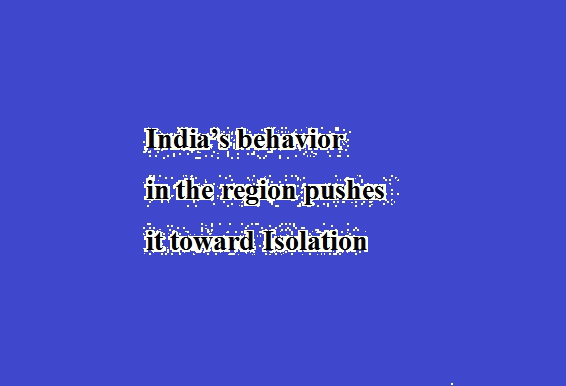Author: Prof. Engr. Zamir Ahmed Awan, Founding Chair GSRRA, Sinologist, Diplomat, Editor, Analyst, Consultant, Advisor, and Non-Resident Fellow of CCG. (E-mail: awanzamir@yahoo.com).
The SCO Summit scheduled for 15-16 October 2024 in Islamabad is set to be a significant event for regional cooperation, bringing together leaders from across the region. However, one notable absentee is Indian Prime Minister Narendra Modi, who has once again chosen not to attend the summit, just as he was absent from the previous SCO Summit in Moscow. Instead, Modi has nominated his Foreign Minister to represent India, which raises questions about his reluctance to actively engage with the Shanghai Cooperation Organization (SCO) and its Eastern partners.
Modi's Reluctance to Engage in SCO Summits
Modi's repeated absence from SCO summits suggests discomfort or reluctance to engage with the organization's core objectives. While the SCO is a platform that promotes regional cooperation, security, and economic development among Eurasian and Asian nations, Modi's preference appears to lean towards organizations like the Quad, AUKUS, and NATO, which are largely dominated by Western countries and serve strategic interests that align with the West's geopolitical agendas. His absence raises doubts about India’s genuine commitment to regional cooperation within platforms like the SCO.
India's Recent Behavior in BRICS
India’s behavior in BRICS (another organization aimed at promoting cooperation among emerging economies) has also been peculiar. While most BRICS nations, including China, Russia, Brazil, and South Africa, are pushing for de-dollarization and promoting trade in local currencies, India has been hesitant and appears to be acting in favor of American interests. This behavior further fuels the argument that India, despite being an Eastern country, is increasingly aligning itself with Western policies, prioritizing US interests over regional cooperation.
India’s Role in SCO and Regional Blocks
India’s participation in the SCO, BRICS, SAARC, or other regional organizations often seems more symbolic than substantive. Despite being a significant regional power, India's actions do not reflect the ethos of these organizations, which focus on cooperation, economic development, and peace. Instead, India has spoiled relations with almost all its immediate neighbors—Pakistan, China, Nepal, Bangladesh, and Sri Lanka—and has consistently adopted a confrontational approach in regional matters.
India's Western Tilt
India’s preference for engaging with distant Western powers over building strong ties with its neighboring countries or regional organizations indicates a significant misfit within platforms like the SCO or BRICS. While these organizations focus on promoting regional harmony, cooperation, and multilateralism, India seems more interested in building alliances that advance Western geopolitical agendas.
India's absence from the SCO Summit in Islamabad, following its similar stance at the SCO Summit in Moscow, coupled with its controversial behavior in BRICS, underscores a growing disconnect between India and the regional organizations that prioritize collective growth, cooperation, and stability. India, once viewed as a key regional player, has increasingly aligned itself with Western-led alliances such as the Quad and AUKUS, distancing itself from the very principles that underpin Eastern platforms like the SCO, BRICS, and SAARC.
India's Declining Credibility in Regional Blocks
India's actions have not gone unnoticed. Its refusal to fully engage in SCO discussions, especially with regard to issues of economic connectivity and regional security, is a glaring signal of its waning commitment to the collective interests of its neighbors. Similarly, India’s opposition to the de-dollarization initiative in BRICS, while other members pushed for reducing dependency on the US dollar, further exposed its inclination toward American interests over regional collaboration. This behavior has not only isolated India but has also led to growing frustrations among member states, who see India as a misfit within these regional frameworks.
In SAARC, India's persistent tensions with neighboring countries, particularly Pakistan, have crippled the organization's ability to function effectively. By pursuing unilateral, confrontational policies, India has alienated itself from the broader South Asian community. Its failure to contribute positively to regional peace and prosperity has raised serious questions about its sincerity and long-term commitment to the collective well-being of the region.
Risk of Expulsion from Regional Platforms
India’s credibility within the SCO, BRICS, and SAARC has been significantly damaged, and if its current trajectory continues, it risks being marginalized or even expelled from these regional blocks. These organizations are built on principles of multilateralism, cooperation, and respect for mutual interests—principles that India increasingly seems to be ignoring. As its actions are increasingly seen as disruptive rather than constructive, there is a growing possibility that India may face diplomatic repercussions, including being sidelined or kicked out of these organizations altogether.
India's Western Tilt and Regional Irrelevance
India's overwhelming eagerness to engage with Western alliances like NATO, Quad, and AUKUS, while avoiding participation in Eastern platforms, highlights its hypocritical approach to regional diplomacy. This tilt toward the West has exposed India’s intentions of prioritizing Western interests at the expense of its own region’s stability and prosperity. Instead of fostering regional partnerships, India has positioned itself as a proxy for Western agendas, which is fundamentally at odds with the goals of Eastern organizations.
India’s Growing Isolation
As the SCO Summit in Islamabad proceeds without Modi, India's repeated absence and controversial positions have left it increasingly isolated on the global stage. Its refusal to engage in constructive dialogue and its alignment with Western geopolitical strategies have led to a significant erosion of its credibility within regional organizations. India is losing its relevance and respect in the SCO, BRICS, and SAARC, and if this trend continues, it may soon find itself without a seat at the table, unable to influence the region’s future.
(ASIA PACIFIC DAILY)
